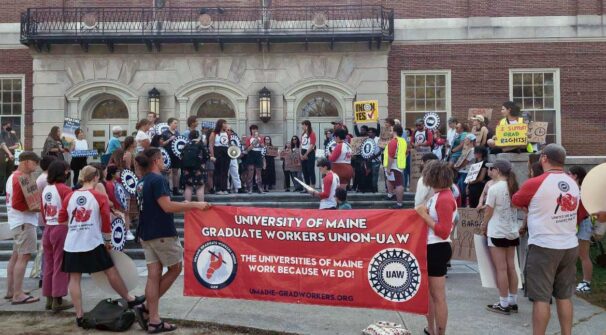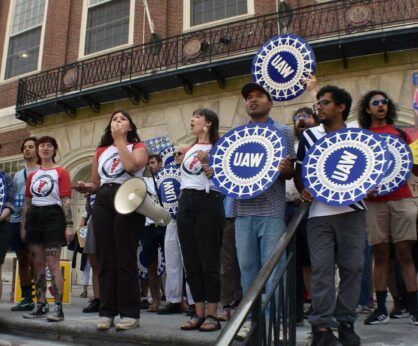
The system cited a need to “focus” on an upcoming hearing for a prohibited practice complaint filed by the union with the Maine Labor Relations Board regarding its initial request for information which is currently ten months outstanding.
Organizer Em Sowles said:
“This information is essential for us as a new union to understand the dynamics of our unit—discrepancies and discrimination in pay, health care coverage, workload, and the like. UMS often says it doesn’t have information because it never considered us employees like the other units. That’s exactly the point. We are either students or workers when it is most convenient for them, but for us, it simply means being overworked and underpaid.”
Amidst a swell of unionization in higher education and among graduate student workers in particular, the union added upwards of 1,000 workers to Maine’s labor movement. Recently graduated organizer Vendy Hazuková cited strong, continued ties with the broader Maine labor movement and pro-labor legislators as significant elements of the union’s historic campaign:
“Organizing with other unions and labor organizations across Maine has been crucial for the success of our campaign. We are not special; grad workers are part of the labor struggle alongside postal workers, paper mill workers, state workers, nurses, and all other workers. We must stand together in solidarity to fight for dignified working conditions for everyone.”
The system voluntarily recognized the union in late September 2023 following a spring card campaign kickoff which demonstrated supermajority support in little over a month. Negotiations for the union’s first contract have been ongoing since November of last year.
UMGWU-UAW members throughout the system decry poor working conditions, subpar living standards, and undignified treatment by their supervisors and university administration.

Organizer Matthew Scandura emphasized the importance of visibility in his speech at the union’s Sept. 18 rally, saying:
“Last semester, when we had in-person bargaining, when the [system bargaining team] finished, they had to walk past all of you as they left the building and look you in the eyes—into the eyes of everyone they’ve been denying fair wages, [denying] protections for international graduate workers…that’s why their team hasn’t shown up today.
“Speaking of showing up, has anyone noticed a new First Aid Kit in your lab or office recently? Want to know why that’s there? Because grad students show up. We went to the [board of trustees], and we told them their First Aid Kits are years out of date…and suddenly, wonderfully, they had to replace them. We had to do that.”
Issues of health and safety were at the forefront of the union’s actions over the summer months. In addition to extreme heat historically uncharacteristic of Maine, graduate workers became concerned with the system’s flagship university in Orono being out of OSHA compliance on employer-provided First Aid Kits.
The union issued a supplemental RFI and organized its members to investigate FAKs and heat issues in their workspaces. The union found that, where present, FAKs were up to 70 years out-of-date and some graduate workers’ laboratories and offices were up to 100°F.
The system had consistently stated in negotiations that maintaining FAKs and upgrading or installing cooling systems in workspaces would be too costly. After the union demonstrated these safety failures in negotiations and delegations to the university president and system board of trustees, the university began implementing cooling systems and replacing FAKs in key buildings.
Beyond individual contract measures, the union maintains that since March the system has been negotiating in bad faith by offering regressive proposals, retracting proposals after the union agreed to them, and fielding a bargaining team that cannot explain its counterproposals and lacks the authority to make agreements.
The issue of bargaining authority is cited in another supplemental RFI issued by the union, wherein it describes the system’s conduct as being in violation of at least two of the parties’ agreed-upon ground rules.
Union negotiator Amanda Gavin explained:
“Five months into the bargaining process [Chancellor Dannel] Malloy revoked the lead negotiator’s authority to sign tentative agreements and required that he be the sole signer. Malloy doesn’t otherwise participate in the bargaining process. UMS’ disorganized hierarchy musters a bargaining team with little knowledge of proposed contract language and has delayed the signing of tentative agreements by as many as three months.”

The union said in its May updates that Chancellor and former Governor of Connecticut Malloy’s poor treatment of graduate workers is in clear contrast with controversial payouts for senior administrators, which have become a source of distrust among other system workers.
Malloy’s administration has also overseen layoffs at the University of Southern Maine earlier this year, in 2022 at the system’s Farmington campus, and just this past Friday, on Sept. 20, in the system’s information technology department. The system’s continued failure to fairly address increased costs of living is a common thread among unions currently in negotiations with UMS.
The system’s “restructuring” comes amidst a series of other austerity measures in recent years, including outsourcing dining services to French multinational Sodexo—known for operating private prisons—and leasing university property to develop a boutique hotel.
Understanding the danger of continued privatization of public institutions—a policy position pushed by conservative think tanks like the Heritage Foundation—the rallying cry for graduate workers has become “Contract now!” as Malloy’s absentee oversight and the disunity of the university system has drawn out the negotiation process.
“Each day UMS delays our contract is another day GWs are forced to endure undignified working and living conditions,” explained union negotiator Addison Bell.










